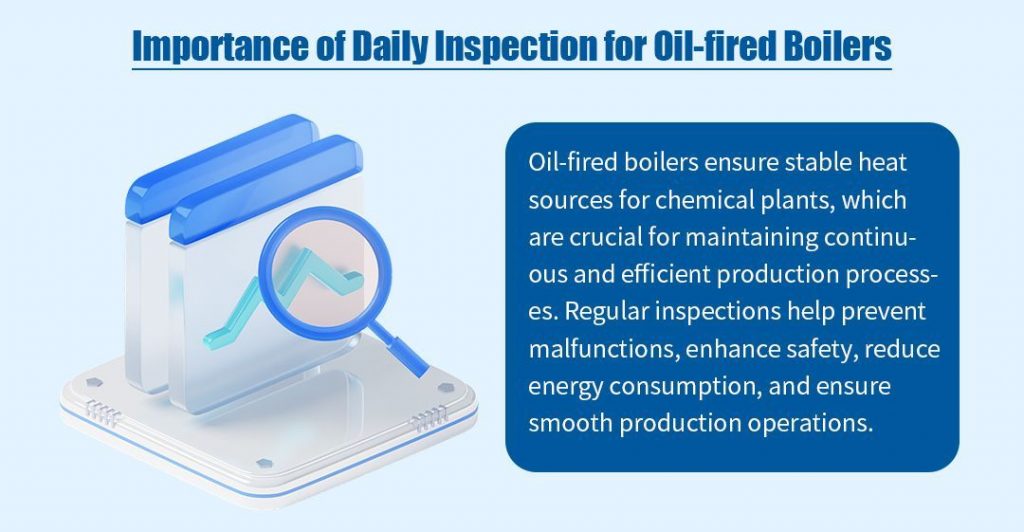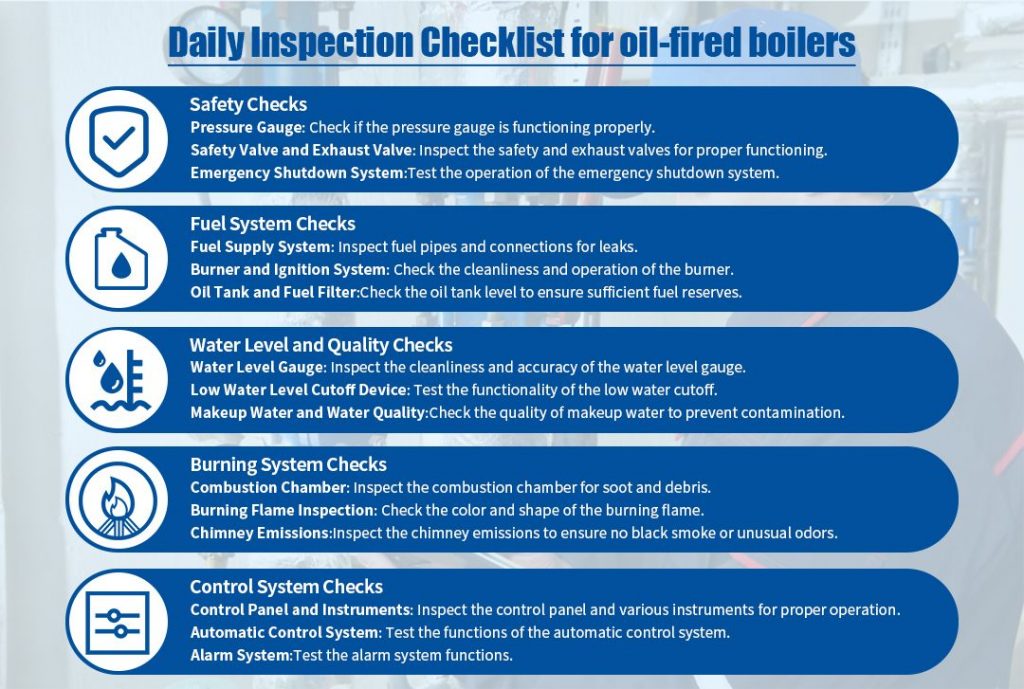
More than any other piece of equipment, oil-fired boilers are central to the operation of most chemical plants, providing heat required for everything from heating raw materials to driving chemical reactions and refining products. This means the plant could be run at its best energy and cost efficiency by having a proper combustion process that would allow the optimized fuel use with advanced combustion technology, keeping energy consumption low and, Perciò, emissions. Yet, even the most finely engineered boiler demands regular attention in order to operate safely and efficiently.
Daily inspections are a must in keeping these boilers in health. The checks to be done routinely will pick up issues such as bad quality fuel, bad combustion, and issues concerning water quality before they become major problems. By the early detection and correction of problems like leaks, corrosione, or scale, you will reduce the danger to your equipment and be sure that the boiler stays in working order. Apart from this, daily inspections will also make it much less probable that you will undergo random failures, which can stop production and cost a lot of money due to downtime. Consistent checks will further improve the overall efficiency of the boiler to ensure that it burns fuel cleanly with low emissions and operates as greenly as possible.
Clear, detailed inspection checklists are critical to help you get the best from your oil-fired boiler. Customized inspection guides specifically for oil-fired boilers in chemical plants, derived from years of Caldaie Fangkuai industry experience, could go a long way in helping assure that operations are on the right track every single day.

Even though oil-fired boilers may appear complicated, their working principles are pretty simple. Basically, these boilers contain just a few main elements: a combustion chamber, a fuel pump, a burner, an ignition instrument, Uno scambiatore di calore, a control system, a fuel tank, and a flue. A simple breakdown of the interaction between them would include:
Camera di combustione: This is where the fuel is burned to produce heat.
Pompa di benzina: Transports fuel from the tank to the combustion chamber.
Bruciatore: Atomizes the fuel and mixes it with air for efficient combustion.
Ignition Device: Lights the fuel-air mixture by sparks into a flame.
Scambiatore di calore: Passes on the heat produced by combustion to water or air, according to what your system requires.
Sistema di controllo: Controls fuel flow, flame intensity, and temperature.
Fuel Tank: The vessel where the fuel oil is stored for the boiler.
Canna fumaria: Safely vents exhaust gases out of the building.
In other words, oil is delivered to the combustion chamber, mixed with air and burned. The high energy released transfers to water generating steam, Acqua calda, or warm air, which it distributes throughout your plant. To add on that, there is a control system that oversees and ensures that the operations are in place to make everything efficient and satisfy the heating need.
The two main types of oil-fired boilers you will tend to see are fire-tube and water-tube. Essentially, a fire-tube unit has hot gas coursing through tubes surrounded by water. It is a simple design but less efficient, while the other water-tube type has water moving through the tubes and being heated by exterior flames. Water-tube boilers possess better heat transfer and are, by and large, more efficient; hence, they are applied in most large, demanding settings.

Pressure Gauge: Check that the pressure gauge is functional. The needle should be free in its movement to and fro, and the reading should not go above the manufacturer’s safety level recommendation. Otherwise, immediate action should be taken.
Safety and Relief Valves: Check each of these for leaks or blockages. Your skill in manually operating these valves will be useful to check whether they function to relieve pressure during an emergency.
Emergency Shutdown System: Test the system on a regular basis. Simulate an emergency to ensure the boiler and all pertinent equipment safely shut down.
Fuel Supply System: Inspect the combustion chamber; clean off any soot or other dirt; check to make sure the chamber is air-tight with no air leakage.
Burner and Ignition System: Look at the flame—it should be stable and blue. If it is yellow or flickering, correct the burner to set the air-fuel mixture.
Fuel Tank and Filter: Ensure that the fuel level is okay and fill in case of necessity. Clean or replace the fuel filter as necessary to avoid blockages that will tend to cut off proper combustion.
Gauge of Water Level: The gauge should be clean and visible. Watch over its level and ensure it is kept at a safe level.
Low Water Cutoff: Test that this unit shuts the boiler down if there is too great a reduction in water level. Damage at this critical part must be prevented.
Makeup Water and Quality: Regular water quality analysis to mitigate scale and corrosion. Confirm the operation of water treatment systems for impurities removal.
Camera di combustione: Regular cleaning of the area to ensure no soot accumulation. Check the seals against the ingress of air.
Flame Check: The color of the flame shall be a steady blue. If not, then regulate the air-fuel ratio until it turns blue.
Chimney Emissions: There should be no black fume or odd smell, as these symptoms indicate incomplete combustion. Make sure the emissions are on par with the environment-friendly level.
Control Panel and Instruments: Ensure all components of the control panel function correctly. Pay attention to the calibration of instruments—do not show incorrect information.
Sistema di controllo automatico: Test the automatic systems of the boiler for combustion and water supply to ensure everything is effective and safe.
Alarm System: Test the alarm system to ensure it will alert in the right amount of time and in the proper way. Simulate system faults to confirm response.
Write down the issues found because it will help in tracking the condition of the boiler for planning maintenance.
Report issues as soon as they are detected and document what you do to fix them. This is another secret of successful problem management.
Inspection records should be reviewed on a regular basis for thoroughness. The process of reviewing inspection records needs to be supervised by management to ensure safety and reliability.
Why is it important to carry out daily checks on oil-fired boilers?
The daily checks assist in keeping your boiler running safely and efficiently, which reduces downtime and extends the life of your unit, thus avoiding costly breakdowns.
What types of problems can daily inspections avoid?
Conducting inspections avoids future problems with the fuel system, cleanliness of the combustion chamber, Dispositivi di sicurezza, and electrical connections.
How do I make a good daily plan for inspection?
It should start by setting the goal clearly, gathering relevant information, setting a standard, and making schedules in between all of these. Review and adjust the plan at regular intervals.
Who is to carry out daily inspections?
Inspection should include operators, team leaders, safety engineers, and management to ensure thoroughness.
What do I do if I find a major problem?
Document the problem, assess its gravity, report it to management, and draw up a plan of action. Transparent issue resolution is key.
Oil-fired boilers are key equipment in many chemical plants, indicating that daily inspections are important. These routine checks assist in the prevention of problems, improvement in efficiency, and extension of equipment life. Effective management and detailed record-keeping are the basic requirements for informed maintenance decisions. Choose brand-dependent boilers, such as Fang Kuai Boilers, which are easy to maintain and reliable in operation. Plant managers should focus more on daily inspections and high-quality equipment to realize safe, efficiente, and environmentally friendly operations in a facility.Se hai bisogno, please contact us through the following contact information:13213222805.
PREVENTIVI CALDAIE GRATUITI
Nessun ritardo, Ottenere 3 citazioni oggi Confronta per i migliori prezzi Sicuro e affidabileRECENSIONI
COSA C'È IN QUESTO ARTICOLO?
vVisualizza le recensioni dei nostri clienti
"La caldaia ad olio diatermico di Fangkuai è molto facile da usare e manutenere. Ci ha aiutato a risparmiare tempo e denaro sulla manutenzione, che ha portato a notevoli risparmi sui costi. La qualità dei materiali e la costruzione della caldaia sono eccezionali. È anche molto efficiente dal punto di vista energetico, che ci ha aiutato a risparmiare sulle nostre bollette energetiche. Consiglio vivamente la caldaia a olio diatermico di Fangkuai ."
Allen
Brasile"Utilizziamo da anni la caldaia ad olio diatermico Fangkuai per il nostro impianto chimico e non ci ha mai deluso. La caldaia è molto resistente e può resistere a condizioni difficili. È anche molto facile da usare e mantenere, che ci ha aiutato a risparmiare tempo e denaro per la manutenzione. Le caldaie ad olio diatermico Fangkuai sono di prim'ordine e le consiglio vivamente a chiunque necessiti di soluzioni di riscaldamento affidabili."
Chang
Cina"I generatori di vapore di Fangkuai sono eccellenti. Sono molto facili da usare e richiedono una manutenzione minima. Anche il servizio clienti di Fangkuai è eccezionale. Sono molto reattivi e sempre disposti ad aiutare. Notevole anche l'efficienza energetica dei generatori di vapore, che mi ha aiutato a risparmiare sulle mie bollette energetiche. Consiglio vivamente i generatori di vapore di Fangkuai."
Maria
Spagna"La caldaia per l'acqua calda di Fangkuai è fantastica. Si riscalda in modo rapido ed efficiente, e l'acqua rimane calda per molto tempo. Non abbiamo mai avuto problemi e ha apportato un miglioramento significativo alle nostre operazioni quotidiane. Anche il processo di installazione è stato molto fluido e il servizio clienti è stato eccellente. Consiglio vivamente le caldaie ad acqua calda di Fangkuai."
Sara
Canada"Il servizio clienti di Fangkuai è di prim'ordine. Mi hanno aiutato a scegliere la caldaia perfetta per le mie esigenze e mi hanno fornito un grande supporto durante tutto il processo. Anche il processo di installazione è stato molto fluido e la caldaia ha superato le mie aspettative. È molto facile da usare e mantenere, e l'efficienza energetica è notevole. Consiglio vivamente i prodotti Fangkuai a chiunque necessiti di soluzioni di riscaldamento affidabili ed efficienti."
Giovanni
Messico"La caldaia a vapore di Fangkuai è perfetta per la mia attività di trasformazione alimentare. Soddisfa tutti i nostri requisiti ed è molto affidabile. La qualità dei materiali e la costruzione della caldaia sono eccezionali. È anche molto facile da usare e mantenere, che ci ha aiutato a risparmiare tempo e denaro per la manutenzione. Consiglio vivamente le caldaie a vapore di Fangkuai a chiunque necessiti di soluzioni di riscaldamento affidabili."
Json
Brasile"Il servizio clienti di Fangkuai è di prim'ordine. Mi hanno aiutato a scegliere la caldaia perfetta per le mie esigenze e mi hanno fornito un grande supporto durante tutto il processo. Anche il processo di installazione è stato molto fluido e la caldaia ha superato le mie aspettative. È molto facile da usare e mantenere, e l'efficienza energetica è notevole. Consiglio vivamente i prodotti Fangkuai a chiunque necessiti di soluzioni di riscaldamento affidabili ed efficienti."
Giovanni
Messico"Ho acquistato una caldaia a vapore Fangkuai per la mia fabbrica e funziona perfettamente da mesi ormai. La qualità dei materiali e la costruzione della caldaia sono impressionanti. È anche molto efficiente dal punto di vista energetico, che ci ha aiutato a risparmiare sulle nostre bollette energetiche. Consiglio vivamente i prodotti Fangkuai a chiunque necessiti di soluzioni di riscaldamento affidabili ed efficienti."
John
Stati Uniti d'America"Sono rimasto molto colpito dalla qualità della caldaia per l'acqua calda di Fangkuai. È costruito per durare e ha superato le mie aspettative. Anche il processo di installazione è stato molto fluido e il servizio clienti è stato eccellente. La caldaia per l'acqua calda è molto facile da usare e manutenere, e l'efficienza energetica è notevole. Consiglio vivamente le caldaie ad acqua calda di Fangkuai."
Jack
Australia